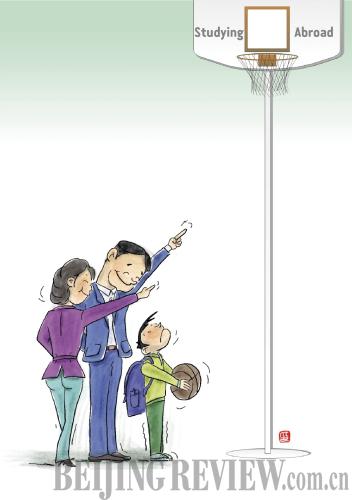|
 |
|
(XINHUA) |
Cai Meng graduated from a junior middle school in Beijing this year. Unfortunately, her grades in the citywide high school entrance exam were not sufficient enough to gain her entry to her dream school. Lucky for her, her parents have a backup plan: sending her to study at one of the top private high schools in the United States.
Cai has spent her whole summer vacation preparing for the move with two intensive education programs: one for improving her English, and another to prepare for the U.S. Secondary School Admission Test. Her score on the test, which is in English, will determine whether the admissions board at her chosen school will admit her.
According to British newspaper The Times, a group of 34 Chinese parents went to Britain last May to hunt for schools and toured several prestigious private schools, including Eton College.
Currently, China sees more students leaving to study overseas than any other nation. According to a report released by the Social Sciences Academic Press on Chinese overseas students last September, the number of Chinese students studying abroad accounted for 14 percent of the entire international students community.
Statistics from the Ministry of Education show that 399,600 Chinese students were admitted to overseas educational institutions in 2012 alone, which was 59,900 more than the previous year, making for a 17.65-percent increase.
In addition to the increasing number, parents are becoming more willing to send their children to be educated outside of China at a younger age. In the past, most Chinese students chose to study overseas for a master's degree or a doctorate, after receiving their undergraduate diploma from a Chinese institution. In recent years, a growing number of Chinese are looking abroad to finish high school.
Starting earlier
Statistics from the U.S. Department of Homeland Security show that only 65 Chinese students were enrolled in American high schools during the 2005-06 academic year. In the 2010-11 year, however, the number soared to 6,725, a 100-fold increase.
"Younger students are accounting for an increasingly large proportion of the applicants to schools and colleges outside of China," said Lu Hongying, a consultant with the Beijing-based EIC Group, which offers services for students wanting to study abroad in preparatory language courses and international summer camp programs.
She said that the youngest child she provided consultancy for was a 6-year-old applying for a kindergarten in Singapore.
Professor Yang Dongping, a member of the National Education Advisory Committee, said that behind the ballooning number of Chinese students on foreign campuses and the rapid increase of the amount of younger children among them is Chinese parents' dissatisfaction with China's current exam-oriented education style and the disparity in higher education between China and Western nations.
"Most parents are aware of the risks of sending their children abroad, but still opt to do so since they feel the benefits outweigh the potential dangers," he noted.
Many Chinese students whose talents, hobbies and interests were not recognized or rewarded at home find there is a more nurturing and encouraging environment on foreign campuses. "Many young students speak highly of the well-rounded education and relaxed learning environment they have found overseas, which can help students to thrive when pursuing their personal interests," said Zhou Mansheng, a senior research fellow with the National Education Development Center under the Ministry of Education. He believes that sending children to study overseas could benefit some parents and families in the long run since students considered mediocre in China may be able to a receive higher quality education abroad with more focus on their personal strengths and that this could help them to have more competitive advantage in the future labor market.
| 